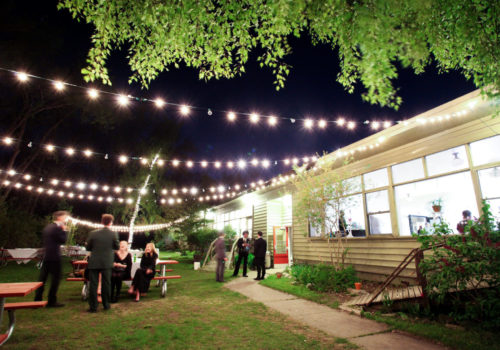Artist residencies offer both a creative production space and an invaluable networking opportunity for both emerging and seasoned artists of all disciplines.
On May 8th, 2018 Neighbourhood Arts Network hosted a 'Let's Talk Art' event at Artscape Gibraltar Point to discuss artist residencies. Keep reading to find out some of the must-knows for applying to artist residencies.

The exterior of Artscape Gibraltar Point
Residency FAQ
- Residencies are either self-directed or thematic.
- Often themed; investigate the theme and see how your work (can) relate to the topic. Emphasizing this in your application will strengthen your potential as a candidate. Themes include artist intention (ie feminist) or catering to a specific diaspora.
- Applications are generally open September through March.
- International artist? Residencies can provide letter of support or invitations which can be used for visa applications, as well as external funding applications from your country of origin.
- 1 week is the recommended minimum stay.
- There are additional costs (on top of the residency fee) which are often unaccounted for. These including transportation (getting there, especially if it requires a flight), food, materials, potential production support and shipping your work back home.
- Canada Council grants can be used to fund paid residencies (i.e. the grant can go towards the cost of travelling).
- Budget your stay: Travel, accommodation, per diem including food and transportation, production of work (materials, renting machines, workspaces, hiring people, etc.,) shipment of work back if needed.
Why Do a Residency?
- Inspirational space
- Provides a networking opportunity with other artists, curators, etc.
- These networking opportunities will also connect you with folks who will inform you of future residency opportunities with may not be explicitly advertised online
- Co-learning space
- Building a supportive community
FYI: How to Prepare for Residency Applications
- Have both a master CV and a 3-page maximum CV updated and digitally accessible (i.e. in Google Docs) at all times.
- Have piece synopsis/descriptions pre-written, so they can easily be copied and pasted into applications.
- Build a website or blog which your application reviewers can reference. This is especially useful for applications which ask for a small sample. Including a link to your website/blog enables those reviewing your application to see more of your work than can be included in the application on its own, strengthening your application.
- Before applying, visit the space to see if you can see yourself working there (if possible).
- Talk to past or present participants of that particular residency to see what their experience was.
- Ask for help! The Toronto Arts Foundation offers grant writing support. Don’t be afraid to call the office of the residency you’re interested in and ask staff questions about the forthcoming residency theme, the general environment/atmosphere, if they look for anything in particular when reviewing applications, and to flag any other needs you may have during your stay (i.e. accessibility, internet, space, production tools).
- Ask yourself what you want from the experience. Are you looking for a quiet space to bang out a project, or to network and foster a collective artist community? Think about your personal and professional intentions will help identify whether an urban (best for networking) or rural (good for independent projects) residency is the best fit for you.
Residency Proposal
- Research the space
- Research the theme (if applicable)
- Your proposal should argue why you need to do this research/work in this particular space (ie why Paris specifically? How will the location impact your production?)
- Be creative when pitching yourself, and ask “how will my medium and vision produce unique and valuable insight into this space/place?”
- Address if there are time gaps in your portfolio. You don’t have to go into detail, but addressing them yourself will be advantageous.
- Use active, positive and definitive words; avoid passive language (i.e. “hope”, “may”).
- Capitalize on the support systems available, whether that is grant writing, language support, accessibility/disability support, etc.
Resources
Social media pages/accounts which note international residency opportunities
Grant and residency application support (i.e. institutions or agencies which offer workshops)
- External funding, through travel grants, such as prince clause (between African countries and Africa and EU)
- Canada council for the arts (Arts abroad)
- On the move (cultural mobility information network)—it provides a network of mobility funding opportunities in different parts of the world
- STEP mobility grant by the European Cultural foundation
- Anna Lindh (Euro-Mediterranean partnership,)
- Asia Europe foundation (ASEF)
- Art institutes such Goethe(for Germany or collaborating with german artists or german spaces, or in the case of Lagos)
- prohelvetia
- French council
- British council